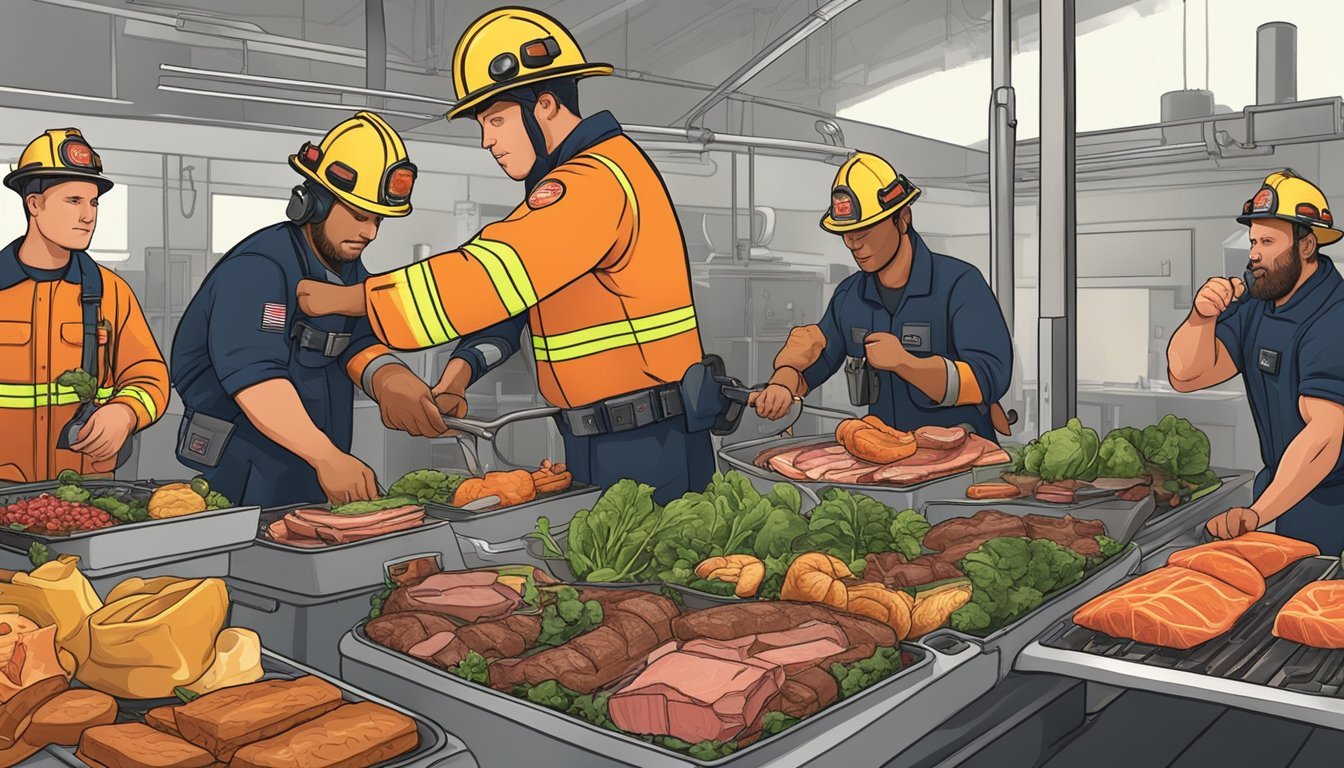The Carnivore Diet for Firefighters
Optimal Nutrition for Peak Performance
Firefighters face some of the most demanding physical challenges of any profession. The nature of their work requires exceptional strength, endurance, and recovery abilities. Nutrition plays a critical role in their overall health and their capacity to perform their duties. The carnivore diet, a regimen focusing on animal products and omitting most other food groups, has gained attention in various circles for its potential benefits, including weight loss and inflammation reduction. This dietary approach is now being considered by some firefighters as a way to meet their high energy needs and support recovery from the intense physical activity inherent to their job.
Adopting the carnivore diet involves consuming primarily meat, with some adherents including other animal products such as eggs and dairy. Proponents suggest that this way of eating provides the high levels of protein and fats critical to sustaining a firefighter’s muscular strength and energy reserves. With a physically taxing occupation that may require a significant caloric intake, the carnivore diet could be tailored to ensure that firefighters receive the necessary nutrients to fuel their strenuous activities.
However, adopting such a restrictive dietary pattern requires careful consideration of nutritional adequacy and long-term health effects. As this diet focuses on animal products, it's essential to balance it with proper intake to maintain health without excessive intake that might lead to other health complications. For firefighters considering the carnivore diet, it is crucial to approach this dietary change with a clear understanding of the benefits and potential risks associated with it, ideally under the guidance of nutrition and health professionals.
Understanding the Carnivore Diet
The Carnivore Diet strictly focuses on animal products and excludes plant-based foods, advocating for meat as the primary source of nutrition.
Defining the Carnivore Diet
The Carnivore Diet is a nutritional plan that includes consuming animal products exclusively and eliminates all plant-based foods. It centers on the idea that optimal health and nutrition can be achieved through a diet consisting mainly of meat, with varying inclusions of eggs, dairy products, and seafood. The diet provides high levels of protein, essential fats, vitamins, and minerals that are naturally present in animal products, while it avoids carbohydrates, sugar, and fiber found in plants.
Origins and Popularity
Historically, the diet simulates the eating patterns of early human ancestors and carnivorous cultures, but it has recently gained more attention due to potential health benefits. The Carnivore Diet has risen in popularity, similar to other low-carb diets like the ketogenic diet, due to reports of weight loss and improved health markers among its adherents.
Contrast with Other Diets
Unlike the Mediterranean or ketogenic diets, the Carnivore Diet does not include plant-derived foods, fibers, and sugars. The keto diet allows for low-carb vegetables and emphasizes fat over protein as the primary source of calories. In contrast, the Mediterranean diet, known for its variety including fruits, vegetables, and whole grains, is rich in fiber and nutrients but with moderate protein intake. The Carnivore Diet is distinguished by its exclusive focus on animal-derived foods, arguing that they contain all the necessary nutrients without the need for plant-based foods.
Nutritional Demands for Firefighters
Firefighters require a specialized nutrition plan to meet the intense physical demands of their job, which includes adequate caloric intake, a balance of macronutrients, consistent hydration, and strategic nutrient timing.
Role of Macronutrients
Firefighters need a tailored balance of macronutrients to sustain energy levels and optimize performance. Studies suggest that calories expended during firefighting activities are significantly high, necessitating greater caloric intake.
Protein: Essential for muscle repair and recovery. Firefighters should aim for a high protein intake, with guidance often exceeding the general public's recommendations.
Fat: Vital for long-term energy. Should be consumed in moderation, focusing on healthy sources such as omega-3 fatty acids.
Carbs: Serve as the primary energy source. Complex carbohydrates are preferable for sustained energy delivery.
Hydration and Electrolytes
Adequate hydration is critical for firefighters due to excessive sweating during physically demanding tasks, which can lead to dehydration and diminished performance.
Water: The cornerstone of hydration. Intake must be sufficient to offset fluid lost through sweating.
Sodium: An important electrolyte that needs to be replenished due to loss in sweat.
Nutrient Timing and Meal Frequency
Nutrient timing and meal frequency can influence a firefighter's energy availability and overall health. Adhering to MDRI guidelines can assist in planning around the strenuous job requirements.
Eating smaller, more frequent meals: Helps maintain energy levels throughout shifts.
Post-incident meals: Should focus on replenishing glycogen stores and providing amino acids for muscle recovery.
Following a diet that meets the energy and nutrient needs specific to firefighting can support the health and performance of these tactical athletes.
Health Implications of the Diet
The carnivore diet may have significant health implications for firefighters who face intense physical demands. This high-protein diet focuses on weight management, potentially alleviates chronic diseases and conditions, and could impact cancer and cardiovascular health outcomes.
Weight Management
Weight Loss: Firefighters may experience weight loss due to reduced calorie intake from eliminating carbohydrates.
Obesity Prevention: The high satiety of meat-based diets could help prevent obesity, a critical factor considering the physically demanding nature of firefighting.
Chronic Diseases and Conditions
Type 2 Diabetes: Consuming only animal products could reduce insulin spikes, aiding in the management of type 2 diabetes.
Inflammation: Some anecdotal evidence suggests that this diet may reduce inflammation, though rigorous research is needed to confirm these claims.
High Blood Pressure and Heart Disease: The long-term effects of high consumption of red meat on blood pressure and heart disease in the context of a carnivore diet remain unclear.
Cancer and Cardiovascular Health
Cancer Risks: Data is inconclusive on the link between a carnivore diet and cancer risk, with some studies indicating potential elevated risks due to a lack of dietary fiber and an increase in carcinogens from cooked meats.
Cardiovascular Disease (CVD): The impact of the carnivore diet on CVD is still under research, especially concerning saturated fat intake and cholesterol levels' effects on coronary heart disease.
Carnivore Diet and Physical Performance
Firefighters require a diet that supports the high demands of their physically intensive tasks. A carnivore diet, heavy in protein and fats, may influence muscle gain, endurance, recovery, flexibility, and mobility essential for their strenuous activities.
Muscle Gain and Maintenance
A carnivore diet is rich in protein, critical for muscle repair and growth. An emphasis on meat consumption ensures a high intake of essential amino acids necessary for muscle synthesis. For example, beef and chicken provide approximately 7 grams of protein per ounce, making them efficient sources to meet the high caloric needs of firefighters.
Beef (per oz): 7g protein
Chicken (per oz): 7g protein
Fish (per oz): 6g protein
Endurance and Recovery
Fats serve as a dense energy source, vital for sustaining prolonged physical activity. A firefighter’s body may utilize the fat from a carnivore diet for energy during extended firefighting efforts. Recovery, a crucial aspect of fitness, is facilitated by the high amounts of protein, aiding in tissue repair post-activity. For instance, eggs, a staple in this diet, offer both fat and protein conducive to endurance and recovery.
Eggs: Vital for endurance (fat) and recovery (protein)
Flexibility and Mobility
While the carnivore diet focuses less on flexibility and mobility, these components are integral for a firefighter's performance. Nutritional support through adequate hydration and micronutrients found in organ meats can complement physical routines designed to maintain one's range of motion.
Organ meats: High in micronutrients supporting overall health
Dietary Risks and Side Effects
Adopting a carnivore diet may have specific implications for firefighters, who are already subject to significant physical demands and occupational hazards. The ensuing subsections address the potential dietary risks and side effects relevant to firefighters considering or following a carnivore diet.
Nutrient Deficiencies
A diet that is exclusively carnivorous can lead to deficiencies in certain vitamins and minerals typically found in plant-based foods. For instance, the absence of fruits and vegetables could result in a lack of vitamin C and fiber, both essential for a healthy immune system and digestive health. Without careful planning, such a diet might also lack adequate levels of vitamins E and K, as well as magnesium and potassium, which are important for muscle function and recovery—a crucial consideration for firefighters.
Digestive Health Concerns
Firefighters on a carnivore diet may experience changes in their digestive health. With the exclusion of fiber-rich plant foods, one might face issues like constipation. On the other hand, the diet's heavy reliance on meats might cause diarrhea in the initial adaptation phase. Since fiber plays a role in supporting a diverse gut microbiome, which is essential for overall health, the carnivore diet's absence of fiber could have long-term effects on the digestive system.
Long-Term Health Risks
Over time, the high intake of saturated fats associated with a carnivore diet could contribute to increased risks of cardiovascular disease, which is already a notable risk for structural firefighters. Additionally, high purine intake from eating a lot of meat can put pressure on the kidneys, potentially leading to kidney stones. Some practitioners of the carnivore diet consume bone broth as a source of minerals; however, it is not a complete safeguard against these risks. Careful monitoring of health markers is advised for firefighters considering this dietary pattern to mitigate potential long-term health risks.
Meal Planning and Preparation
Firefighters require a diet that sustains their energy levels and meets the physical demands of their job. The carnivore diet for firefighters should focus on animal-based foods that provide high-quality protein and fats, crucial for repairing muscles and maintaining overall health.
Creating a Balanced Meal Plan
A balanced meal plan for firefighters on a carnivore diet should prioritize a variety of animal proteins, including beef, pork, lamb, chicken, fish, and organ meats like liver. These foods provide essential nutrients and are energy-dense, which is important for the physically demanding work of firefighting.
Breakfast might include scrambled eggs and bacon, offering a mix of fats and proteins.
Lunch could feature a turkey burger topped with a fried egg, combining different sources of animal protein.
Dinner may consist of a pork chop cooked in butter, providing both protein and fat for recovery.
Meals should be spread evenly throughout the day to ensure sustained energy levels.
Cooking and Recipe Ideas
Incorporating a range of cooking methods and recipe ideas can keep the carnivore diet interesting and palatable.
Organ meat pie is a nutrient-rich option that includes a variety of organ meats.
Smoked salmon paired with a sausage patty can offer omega-3 fatty acids and satisfying proteins.
Chicken thighs (What wine goes well with chicken thighs?) with mozzarella injects a delicious fat source alongside the protein.
Grilling, roasting, and slow cooking are great methods to prepare meats in bulk, which saves time and ensures ready-to-eat options.
Online shopping for electric grill and slow cooker is the smart choice for a seamless transaction!
Shopping for Carnivore Diet Foods
When shopping for a carnivore diet, firefighters should focus on quality cuts of meat and a variety of animal products. Here’s a simple shopping list template tailored toward the carnivore diet:
Meat: Ribeye, ground beef, pork chops, lamb rack, chicken drumsticks
Seafood: Wild-caught salmon, shrimp, crab
Animal Fats: Butter, tallow, egg yolks
Organ Meats: Liver, heart, kidney
Dairy (if tolerated): Hard cheeses, heavy cream
Purchasing in bulk can be cost-effective, and opting for local butchers or farmers' markets may provide access to grass-fed and ethically raised options.
Enjoy the convenience of doorstep delivery when you buy tallow online!
Addressing Common Concerns
In adopting the carnivore diet, firefighters must consider the implications on their health, allergies, and the sustainability of their food sources. Addressing these concerns is crucial for maintaining optimal performance in their demanding roles.
Accounting for Allergies and Intolerances
Individuals with allergies to certain animal products can face challenges on a carnivore diet. It's important for firefighters with such allergies to identify safe animal-based foods and to seek alternatives within the diet's constraints. For instance:
Allergy to eggs: Exclude eggs and focus on meats and dairy (if tolerated).
Dairy intolerance: Emphasize cuts of meat and organ meats while avoiding dairy products.
Key nutrients, such as calcium for dairy intolerances, may be sought from bone-in fish or supplements under medical guidance.
Debunking Myths
There are misconceptions about the health effects of a diet rich in animal products. One prevalent myth is that such a diet will invariably lead to high cholesterol and heart issues. However, recent studies suggest that the relationship between dietary cholesterol intake and blood cholesterol levels is not as direct as once thought. For those concerned about cholesterol, opting for leaner meats and incorporating regular health screenings can help manage risk.
Sustainable and Ethical Considerations
Firefighters considering the carnivore diet should also evaluate sustainability and ethics related to animal products. They have the option to choose meats from sources that prioritize:
Sustainable farming practices: Favoring suppliers who use regenerative agriculture techniques.
Humane treatment of animals: Opting for sources that ensure animals are raised in cruelty-free environments.
These choices contribute to a more ethical and sustainable approach to the carnivore diet. Firefighters can benefit from seeking out local suppliers committed to these practices to minimize their environmental footprint.
Customizing the Carnivore Diet for Firefighters
Firefighters, often comparable to tactical athletes in their physical demands, require a customized dietary approach to meet their high energy and nutrition needs. The Carnivore Diet may be tailored to fit individual requirements and workload intensity.
Adjustments for Individual Needs
Each firefighter's body is unique, with distinct energy and nutrient demands influenced by factors such as age, health status, and level of physical activity. Customization of the Carnivore Diet for firefighters centers on the balance and types of animal-based foods, accounting for these variations. Younger firefighters might demand higher calorie intakes for energy, while older colleagues may focus on lean meats to maintain cardiovascular health.
Age and Activity Level: Younger and highly active firefighters may incorporate more calorie-dense meats like ribeye steaks (What wine goes well with ribeye steak?), whereas older firefighters or those less active may opt for leaner cuts.
Health Status: Those with specific health concerns might need to choose meats with lower levels of cholesterol and saturated fats.
Supplementation and Alternatives
Considering that the Carnivore Diet is predominantly meat-based, there is potential for certain nutrient deficiencies. Firefighters may need to supplement their diet to ensure adequate intake of vitamins and minerals not sufficiently present in meat.
Vitamin C and Fiber: Since fruits and vegetables are excluded, a vitamin C supplement might be necessary, along with a non-vegetable fiber source to promote digestive health.
Calcium and Vitamin D: Dairy products or supplements can help maintain bone health, particularly important for the physical work of firefighters.
Take advantage of the wide variety of online options when shopping for a vitamin C, calcium, and vitamin D!
Transitioning to the Diet Safely
A gradual shift to the Carnivore Diet reduces potential discomfort and allows the body to adapt to the change in fuel sources. Firefighters should consult healthcare professionals before making drastic dietary changes to ensure it aligns with their health needs and the demands of their duty.
Start Small: Introduce more animal products into meals while reducing carbohydrate intake slowly over weeks.
Monitor Response: Pay attention to how the body reacts during the transition and adjust food choices accordingly.
Monitoring and Adapting the Diet
Making adjustments to a carnivore diet for firefighters requires consistent monitoring and careful consideration of health, performance, and mental well-being. This includes regular health evaluations, tracking performance metrics, and being vigilant about psychological effects. It is vital that firefighters take these steps to ensure the diet meets the intense demands of their occupation without compromising their overall health.
Regular Health Evaluations
Firefighters on a carnivore diet should undergo regular health evaluations to monitor key health markers. Blood work and physical exams can reveal if they are meeting their nutritional needs and identify any potential deficiencies or health issues, such as arthritis or markers indicative of cardiovascular health problems. The evaluations should encompass:
Complete blood count (CBC)
Lipid profiles
Inflammation markers
Blood pressure and heart rate
Health evaluations should be conducted at least bi-annually to ensure timely adaptation of the diet based on the individual's health status.
Performance Metrics
To assess the effectiveness of the carnivore diet on physical fitness, firefighters should keep track of performance metrics. These can be quantified through a series of fitness tests measuring:
Cardiovascular endurance
Recovery times after physical exertion
Improvements or declines in these areas might hint at the need to adjust protein and fat intake or to reconsider the diet's compatibility with the individual's fitness demands.
Psychological Effects and Mental Health
The impact of diet on mental health cannot be overstated. Firefighters should be aware of any changes in their psychological well-being, such as symptoms of anxiety or depression, when following a carnivore diet. To evaluate these effects:
Regular consultations with a psychologist or counselor.
Self-reporting through mood diaries or questionnaires.
These measures can help discern if the diet affects their mental health and necessitate changes to their eating habits or additional mental health support.
Future Considerations and Research
With a physically intensive job like firefighting, diet plays a crucial role in performance and health. Future research will be vital to understand the impact of a carnivore diet on firefighters and to guide nutritional practices for this demanding profession.
Emerging Studies on Carnivore Diet
Recent Initiatives: Researchers are beginning to explore the specific nutritional needs of firefighters. Studies focused on the carnivore diet's role in this demographic could provide valuable data on its efficacy and potential health outcomes. Key Focus Areas:
The impact on energy levels, muscle recovery, and overall job performance.
Long-term health effects, considering the increased risk of cancer and cardiovascular diseases in firefighters.
Study Design and Sample Size: Rigorous clinical trials with larger sample sizes and diverse demographics will be essential for obtaining reliable data.
Future Dietary Guidelines
Nutrition Guidelines: Based on upcoming research, there may be a shift in nutritional guidelines tailored to the unique needs of firefighters. These guidelines will likely:
Emphasize the importance of nutrient density and bioavailability.
Address meal timing and frequency to align with shift patterns and work demands.
Health Eating Patterns: Establishing healthy eating patterns that incorporate or modify the carnivore diet may become a key focus in dietary interventions.
Technological Advances in Nutrition
Advancements in Technology: Technology will play a pivotal role in the evolution of nutrition guidelines and diet tracking. Expect to see:
The development of personal nutrition tracking devices catering to firefighters' specific health metrics.
Use of AI and machine learning to analyze dietary patterns and predict outcomes on firefighters' health.
By leveraging technology, researchers can tailor nutritional plans that are grounded in empirical data and real-time health monitoring, thus supporting firefighters' dietary needs more effectively.













